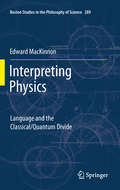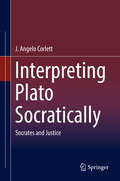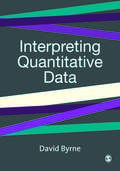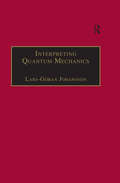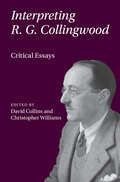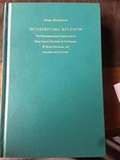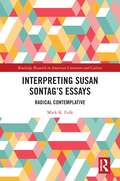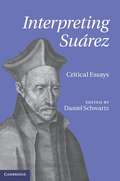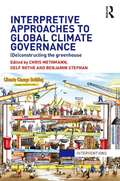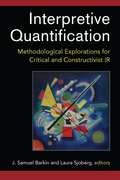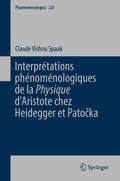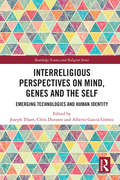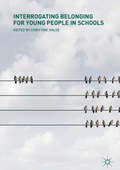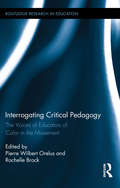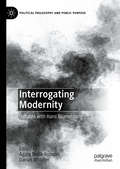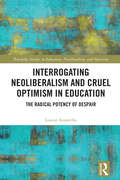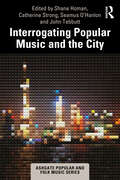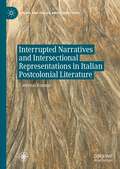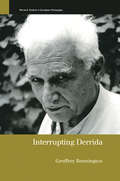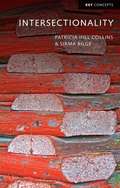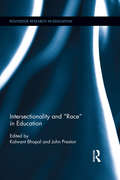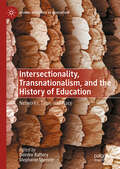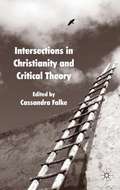- Table View
- List View
Interpreting Physics
by Edward MackinnonThis book is the first to offer a systematic account of the role of language in the development and interpretation of physics. An historical-conceptual analysis of the co-evolution of mathematical and physical concepts leads to the classical/quatum interface. Bohrian orthodoxy stresses the indispensability of classical concepts and the functional role of mathematics. This book analyses ways of extending, and then going beyond this orthodoxy orthodoxy. Finally, the book analyzes how a revised interpretation of physics impacts on basic philosophical issues: conceptual revolutions, realism, and reductionism.
Interpreting Plato Socratically: Socrates And Justice
by J. Angelo CorlettJ. Angelo Corlett’s new book, Interpreting Plato Socratically continues the critical discussion of the Platonic Question where Corlett’s book, Interpreting Plato’s Dialogues concluded. New arguments in favor of the Mouthpiece Interpretation of Plato’s works are considered and shown to be fallacious, as are new objections to some competing approaches to Plato’s works.The Platonic Question is the problem of how to approach and interpret Plato’s writings most of which are dialogues. How, if at all, can Plato’s beliefs, doctrines, theories and such be extracted from dialogues where there is no direct indication from Plato that his own views are even to be found therein? Most philosophers of Plato attempt to decipher from Plato’s texts seemingly all manner of ideas expressed by Socrates which they then attribute to Plato. They seek to ascribe to Plato particular views about justice, art, love, virtue, knowledge, and the like because, they believe, Socrates is Plato’s mouthpiece through the dialogues. But is such an approach justified? What are the arguments in favor of such an approach? Is there a viable alternative approach to Plato’s dialogues?In this rigorous account of the dominant approach to Plato’s dialogues, there is no room left for reasonable doubt about the problematic reasons given for the notion that Plato’s dialogues reveal either Plato’s or Socrates’ beliefs, doctrines or theories about substantive philosophical matters.Corlett’s approach to Plato’s dialogues is applied to a variety of passages throughout Plato’s works on a wide range of topics concerning justice. In-depth discussions of themes such as legal obligation, punishment and compensatory justice are clarified and with some surprising results. Plato’s works serve as a rich source of philosophical thinking about such matters. A central question in today’s Platonic studies is whether Socrates, or any other protagonist in the dialogues, presents views that the author wanted to assert or defend. Professor Corlett offers a detailed defense of his view that the role of Socrates is to raise questions rather than to provide the author’s answers to them. This defense is timely as intellectual historians consider the part played by Academic scholars centuries after Plato in systematizing Platonism. J. J. Mulhern, University of Pennsylvania
Interpreting Proclus
by Stephen GershThis is the first book to provide an account of the influence of Proclus, a member of the Athenian Neoplatonic School, during more than one thousand years of European history (ca 500-1600). Proclus was the most important philosopher of late antiquity, a dominant (albeit controversial) voice in Byzantine thought, the second most influential Greek philosopher in the later western Middle Ages (after Aristotle), and a major figure (together with Plotinus) in the revival of Greek philosophy in the Renaissance. Proclus was also intensively studied in the Islamic world of the Middle Ages and was a major influence on the thought of medieval Georgia. The volume begins with a substantial essay by the editor summarizing the entire history of Proclus' reception. This is followed by the essays of more than a dozen of the world's leading authorities in the various specific areas covered.
Interpreting Quantitative Data
by David ByrneHow do quantitative methods help us to acquire knowledge of the real world? What are the `do's' and `don'ts' of effective quantitative research? This refreshing and accessible book provides students with a novel and useful resource for doing quantitative research. It offers students a guide on how to: interpret the complex reality of the social world; achieve effective measurement; understand the use of official statistics; use social surveys; understand probability and quantitative reasoning; interpret measurements; apply linear modelling; understand simulation and neural nets; and integrate quantitative and qualitative modelling in the research process. Jargon-free and written with the needs of students in mind, the book will be required reading for students interested in using quantitative research methods.
Interpreting Quantum Mechanics: A Realistic View in Schrodinger's Vein
by Lars-Göran JohanssonPresenting a realistic interpretation of quantum mechanics and, in particular, a realistic view of quantum waves, this book defends, with one exception, Schrodinger's views on quantum mechanics. Johansson goes on to defend the view that the collapse of a wave function during a measurement is a real physical collapse of a wave and argues that the collapse is a consequence of quantisation of interaction. Lastly Johansson argues for a revised principle of individuation in the quantum domain and that this principle enables a sort of explanation of non-local phenomena.
Interpreting R. G. Collingwood: Critical Essays
by David Collins Christopher WilliamsAn indisputably prominent figure in twentieth-century philosophy, R. G. Collingwood often remains elusive even to those who admire his achievements. This volume of new essays aims to reintroduce Collingwood to twenty-first-century philosophical readers and to show why, and how, his achievements matter. Each essay offers an original contribution to the understanding of some aspect of Collingwood's thought, including new interpretations of several of his central ideas, re-examinations of his place in twentieth-century philosophy, and an extended consideration of a previously undiscussed manuscript. The essays span the wide range of Collingwood's interests, including metaphysics, epistemology, logic, philosophy of mind, aesthetics, and political philosophy, as well as Roman British history and the history of art. Emphasis is placed on Collingwood's connections to traditions with which his name is not typically linked, including pragmatism, analytic philosophy, and phenomenology. This rich volume will stimulate further examination of Collingwood and his legacy.
Interpreting Religion: The Phenomenological Approaches of Pierre Daniel Chantepie De La Saussaye, W. Brede Kristensen, and Gerardus Van Der Leeuw
by George Alfred JamesThe nature of what has been termed the ""phenomenology of religion"" has been the subject of controversy and confusion within the academic study of religion since the early 1950s. Here George Alfred James attempts to clarify the subject through an exploration of the self-understanding of three of its key exponents: Pierre D#65533; Niel Chantepie de la Saussaye, W. Brede Kristensen, and Gerardus van der Leeuw. <p><p> Though the three are widely acknowledged to have had a decisive impact on the phenomenology of religion, they are not widely studied. James deals with each of the three in turn and shows how each saw his efforts as at once a-historical, a-theological, and anti-reductive. According to James, this family of phenomenological approaches can contribute a wealth of insight to the study of religion today. The author offers a groundbreaking challenge to the received image of the phenomenology of religion as an approach of merely historical interest. He shows that phenomenology of religion is not a development or application of the philosophical method initiated by Edmund Husserl, but an approach to religion that has its own claim to authenticity as a discipline distinct from theology, from the history of religions, and from contemporary social scientific approaches to religion. <p><p> Phenomenology of religion is revealed to be a radical departure from contemporary efforts to understand the religious dimension of human nature and culture. Interpreting Religion reveals how the exponents of the phenomenology of religion were concerned with avoiding doctrinaire interpretations on the one hand and reductionism on the other, and explains their varying strategies for achieving this goal. It also shows how successive efforts toward a phenomenological approach to religion have addressed the weaknesses, and built upon the insights, of earlier efforts of this nature. The book advocates a reexamination of the phenomenology of religion in the light of recent developments in post-modern theology, literary criticism, and philosophy. George Alfred James lives in Denton, Texas, where he is associate professor of philosophy and religion studies at the University of North Texas. He has contributed articles to a variety of publications, including The Journal of Religion and The Encyclopedia of Religion.
Interpreting Schelling
by Lara OstaricThis book is the first collection of essays on Schelling in English that systematically explores the historical development of his philosophy. It addresses all four periods of Schelling's thought: his Transcendental Philosophy and Philosophy of Nature, his System of Identity [Identitätsphilosophie], his System of Freedom, and his Positive Philosophy. The essays examine the constellation of philosophical ideas that motivated the formation of Schelling's thought, as well as those later ones for which his philosophy laid the foundation. They therefore relate Schelling's philosophy to a broad range of systematic issues that are of importance to us today: metaphysics, epistemology, aesthetics, ethics, our modern conceptions of individual autonomy, philosophy of history, philosophy of religion, political philosophy, and theology. The result is a new interpretation of Schelling's place in the history of German Idealism as an inventive and productive thinker.
Interpreting Susan Sontag’s Essays: Radical Contemplative (Routledge Research in American Literature and Culture)
by Mark K. FulkInterpreting Susan Sontag’s Essays: Radical Contemplative offers its readers a scholarly examination of her essays within the context of philosophy and aesthetic theory. This study sets up a dialogue between her works and their philosophical counterparts in France and Germany, including the works of Hannah Arendt, Jacques Derrida, Roland Barthes, and Walter Benjamin. Artists and concepts discussed in relation to Sontag’s essays include the works of Andy Warhol, Pop Art, French New Wave Cinema, the music of John Cage, and the cinematic art of Robert Bresson, Leni Riefenstahl, Ingmar Bergman, and Jean-Luc Godard. Her aesthetic formalism is compared with Harold Bloom, and this is the first volume to examine her late works and their position within the American events of 9/11/01 and the War on Terror(ism).
Interpreting Suárez
by Daniel SchwartzFrancisco Suárez is arguably the most important Neo-Scholastic philosopher and a vital link in the chain leading from medieval philosophy to that of the Renaissance and the Enlightenment. Long neglected by the Anglo-Saxon philosophical community, this sixteenth-century Jesuit theologian is now an object of intense scholarly attention. In this volume, Daniel Schwartz brings together essays by leading specialists which provide detailed treatment of some key themes of Francisco Suárez's philosophical work: God, metaphysics, meta-ethics, the human soul, action, ethics and law, justice and war. The authors assess the force of Suárez's arguments, set them within their wider argumentative context and single out influences and appraise competing interpretations. The book is a useful resource for scholars and students of philosophy, theology, philosophy of religion and history of political thought and provides a rich bibliography of secondary literature.
Interpretive Approaches to Global Climate Governance: (De)constructing the Greenhouse (Interventions)
by Delf Rothe Benjamin Stephan Chris MethmannGlobal climate change is perceived to be one of the biggest challenges for international politics in the 21st century. This work seeks to fuse a global governance perspective together with different interpretive approaches, offering a novel way of looking at international climate politics. Equipped with a common interpretive tool-kit, the authors examine different issue-areas and excavate the contours of an overall pattern – the depoliticisation of climate governance. It is this concept which represents the overarching theme connecting the different contributions, addressing issues such as how the securitization of climate change conceals its socio-economic roots; how highly political decisions and value-judgements are couched in the terms of science; how the reframing of climate change as a matter of economic calculation and investment narrows the scope of political action; and how the prevailing concentration on technological solutions to climate change turns it into a mere administrative issue to be tackled by experts. Highlighting the depoliticisation of highly political issues provides a means to bring the political back into one of the most important issue areas of 21st century world politics. The editors have assembled a series of 14 interpretive inquiries into discourses of global climate governance which aim to flesh out an interpretive methodology, demonstrating the value it offers to those seeking to achieve a better understanding of global climate governance. This work will be of great interest to students and scholars of environmental politics, political theory and climate change.
Interpretive Quantification: Methodological Explorations for Critical and Constructivist IR
by J. Samuel Barkin Laura SjobergCountering the growing divide between positivists who embrace quantitative, numerical approaches and post-positivist scholars who favor qualitative, interpretive approaches, J. Samuel Barkin and Laura Sjoberg argue that both methods are more widely adaptable than is commonly assumed by either camp. In Interpretive Quantification, ten highly regarded scholars in the field of International Relations apply quantitative methods and formal models to specific constructivist and critical research questions. In this way, each chapter serves not only as evidence that methods can productively be applied across paradigms, but also as a guide as to how this may be done. In sum, the contributors make a compelling case that when researchers cordon off particular methods for merely ideological reasons, they circumscribe their own paradigms and hinder their own research agenda.
Interprétations phénoménologiques de la 'Physique' d’Aristote chez Heidegger et Patočka (Phaenomenologica #223)
by Claude Vishnu SpaakCet ouvrage met en œuvre une confrontation philosophique entre Heidegger et Patočka, deux figures majeures de la tradition phénoménologique, en prenant pour fil conducteur leurs interprétations respectives des concepts fondamentaux de la Physique d’Aristote. Mais tout d’abord, le point d’accord : l’herméneutique de l’aristotélisme représente aux yeux de Heidegger et de Patočka une première entrée pensante dans l’affaire même de la pensée, où le mouvement (κίνησις/μεταβολή), irréductible au déplacement d’un étant dans l’espace, désigne le procès d’advenue au paraître qui sous-tend l’éclosion à l’être des choses. Aristote met au jour la différence ontologique entre l’être et l’étant, en sorte que la Physique constitue de ce point de vue pour Heidegger et Patočka le véritable Grundbuch de la philosophie occidentale. Cependant, Heidegger et Patočka ne comprennent pas de la même manière le sens de ce mouvement ontologique au cœur de l’être (φύσις). À travers l’examen de ces différences, l’enjeu de cet ouvrage est de mettre en évidence un point de tension au sein de la phénoménologie qui n’a pas encore été suffisamment remarqué, entre d’une part l’approche heideggérienne qui soumet l’être au sens (λόγος), et s’expose de la sorte au risque d’un anthropocentrisme ontologique larvé. Et d’autre part, la tentative d’un réalisme phénoménologique, dont Patočka fut l’un des représentants, dans la double mesure où il brise l’identité classique de l’être et de l’intelligibilité, et où il pense l’homme comme radicalement décentré, prétendant en finir ainsi avec le sujet et tous ses avatars (c’est là le sens de la fameuse « phénoménologie asubjective ») ; réalisme radical dont on peut toutefois se demander s’il ne met pas à mal le paradigme phénoménologique de l’a priori de la corrélation entre l’apparaître et ses modes subjectifs de donnée, et s’il ne remet pas en cause ainsi la possibilité même de la phénoménologie en la poussant au-delà de sa propre limite.
Interreligious Perspectives on Mind, Genes and the Self: Emerging Technologies and Human Identity (Routledge Science and Religion Series)
by Joseph Tham Chris Durante Alberto García GómezAttitudes towards science, medicine and the body are all profoundly shaped by people’s worldviews. When discussing issues of bioethics, religion often plays a major role. In this volume, the role of genetic manipulation and neurotechnology in shaping human identity is examined from multiple religious perspectives. This can help us to understand how religion might affect the impact of the initiatives such as the UNESCO Declaration in Bioethics and Human Rights. The book features bioethics experts from six major religions: Buddhism, Confucianism, Christianity, Islam, Hinduism, and Judaism. It includes a number of distinct religious and cultural views on the anthropological, ethical and social challenges of emerging technologies in the light of human rights and in the context of global bioethics. The contributors work together to explore issues such as: cultural attitudes to gene editing; neuroactive drugs; the interaction between genes and behaviours; the relationship between the soul, the mind and DNA; and how can clinical applications of these technologies benefit the developing world. This is a significant collection, demonstrating how religion and modern technologies relate to one another. It will, therefore, be of great interest to academics working in bioethics, religion and the body, interreligious dialogue, and religion and science, technology and neuroscience.
Interrogating Belonging for Young People in Schools
by Christine HalseIn an era when many young people feel marginalized and excluded, this is the first comprehensive, critical account to shed new light on the trouble of ‘belonging’ and how young people in schools understand, enact and experience ‘belonging’ (and non-belonging). It traverses diverse dimensions of identity, including gender and sexuality; race, class, nation and citizenship; and place and space. Each section includes a provocative discussion by an eminent and international youth scholar of youth, and is essential reading for anyone involved with young people and schools. This book is a crucial resource and reference for sociology of education courses at all levels as well as courses in student inclusion, equity and student well-being.
Interrogating Critical Pedagogy: The Voices of Educators of Color in the Movement (Routledge Research in Education)
by Pierre Wilbert Orelus Rochelle BrockEducators, teacher practitioners, and social activists have successfully used critical pedagogy as a tool to help marginalized students develop awareness and seek alternative solutions to their poor educational and socioeconomic situations. However, this theory is often criticized as being mostly dominated by privileged white males, bringing issues of race and gender to the forefront. This volume provides insight on how critical pedagogy can be helpful to scholars and teachers alike in their analysis of racial, gender, linguistic and political problems. It features a wide range of respected scholars who examine the way and the degree to which critical pedagogy can be used to improve education for students of color, women and other marginalized groups.
Interrogating Modernity: Debates with Hans Blumenberg (Political Philosophy and Public Purpose)
by Daniel Whistler Agata Bielik-RobsonInterrogating Modernity returns to Hans Blumenberg's epochal The Legitimacy of the Modern Age as a springboard to interrogate questions of modernity, secularisation, technology and political legitimacy in the fields of political theology, history of ideas, political theory, art theory, history of philosophy, theology and sociology. That is, the twelve essays in this volume return to Blumenberg's work to think once more about how and why we should value the modern. Written by a group of leading international and interdisciplinary researchers, this series of responses to the question of the modern put Blumenberg into dialogue with other twentieth, and twenty-first century theorists, such as Arendt, Bloch, Derrida, Husserl, Jonas, Latour, Voegelin, Weber and many more. The result is a repositioning of his work at the heart of contemporary attempts to make sense of who we are and how we’ve got here.
Interrogating Neoliberalism and Cruel Optimism in Education: The Radical Potency of Despair (Routledge Studies in Education, Neoliberalism, and Marxism)
by Louise AzzarelloThis book is a philosophical examination of the ways in which neoliberalism underpins and impedes public education. It proposes that education’s adoption of neoliberal logic generates a sense of despair amongst educators, who often enter the profession with the hope of building a better, more just world.Drawing on the author’s 27 years of experience as a secondary classroom teacher and engaging with a range of theoretical concepts, cultural objects, and scenes of violence from her time in the classroom, The Radical Potency of Despair renders visible the ongoing harms that neoliberal logic creates for education and educators. The author proposes a new “ruptured fantasy of education” and suggests that it is not hope that ignites educators who keep fighting for education, but rather despair. Despair is conceived of as a generative force, provoking educators to hold time and space open for pedagogical encounters that interrupt the ongoing instrumentalization of education. The author further conceptualizes a notion of thinking with images as a pedagogical interruptive force. Thinking with images, she argues, gives students time and space to attend to what they see, thus affording them the chance to think differently about the violence of modern society. Such pedagogical interruptions are presented as a refusal of the normative order of education, countering present infrastructures that aim to constrain and instrumentalize education.A compelling and original volume, it will appeal to scholars, researchers, and upper-level students with interests in neoliberalism and education, the philosophy of education, critical pedagogy, and educational policy and politics.
Interrogating Popular Music and the City (ISSN)
by Catherine Strong Shane Homan Seamus O'Hanlon John TebbuttHow does popular music influence the culture and reputation of a city, and what does a city do to popular music? Interrogating Popular Music and the City examines the ways in which urban environments and music cultures intersect in various locales around the globe. Music and cities have been partners in an often clumsy, sometimes accidental but always exciting dance. Heritage and immigration, noise and art, policy and politics are some of the topics that are addressed in this critical examination of relationships between cities and music. The book draws upon an international array of researchers, encompassing hip hop in Beijing; the city favelas of Brazil; from Melbourne bars to European parliaments; to heritage and tourism debates in Salzburg and Manchester. In doing so, it interrogates the different agendas of audiences, musicians and policy-makers in distinct urban settings.
Interrupted Narratives and Intersectional Representations in Italian Postcolonial Literature (Italian and Italian American Studies)
by Caterina RomeoThis book argues for the importance of adopting a postcolonial perspective in analysing contemporary Italian culture and literature. Originally published in Italian in 2018 as Riscrivere la nazione: La letteratura italiana postcoloniale, this new English translation brings to light the connections between the present, the colonial past and the great historical waves of international and intranational migration. By doing so, the book shows how a sense of Italian national identity emerged, at least in part, as the result of different migrations and why there is such a strong resistance in Italy to extending the privilege of italianità, or Italianness, to those who have arrived on Italian soil in recent years. Exploring over 100 texts written by migrant and second-generation writers, the book takes an intersectional approach to understanding gender and race in Italian identity. It connects these literary and cultural contexts to the Italian colonial past, while also looking outwards to a more diffuse postcolonial condition in Europe.
Interrupting Derrida (Warwick Studies in European Philosophy)
by Geoffrey BenningtonOne of the most significant contemporary thinkers in continental philosophy, Jacques Derrida’s work continues to attract heated commentary among philosophers, literary critics, social and cultural theorists, architects and artists. This major new work by world renowned Derrida scholar and translator, Geoffrey Bennington, presents incisive new readings of both Derrida and interpretations of his work. Part one sets out Derrida’s work as a whole and examines its relevance to, and ‘interruption’ of, the traditional domains of ethics, politics and literature. The second part of the book presents compelling insights into some important motifs in Derrida’s work, such as death, friendship, psychoanalysis, time and endings. The final section introduces trenchant appraisals of other influential accounts of Derrida’s work. This influential and original contribution to the literature on Derrida is marked by a commitment to clarity and accuracy, but also by a refusal to simplify Derrida’s often difficult thought.
Intersectionality
by Patrica Hill Collins Sirma BilgeThe concept of intersectionality has become a hot topic in academic and activist circles alike. But what exactly does it mean, and why has it emerged as such a vital lens through which to explore how social inequalities of race, class, gender, sexuality, age, ability and ethnicity shape one another? In this new book Patricia Hill Collins and Sirma Bilge provide a much-needed, introduction to the field of intersectional knowledge and praxis. They analyze the emergence, growth and contours of the concept and show how intersectional frameworks speak to topics as diverse as human rights, neoliberalism, identity politics, immigration, hip hop, global social protest, diversity, digital media, Black feminism in Brazil, violence and World Cup soccer. Accessibly written and drawing on a plethora of lively examples to illustrate its arguments, the book highlights intersectionality's potential for understanding inequality and bringing about social justice oriented change. Intersectionality will be an invaluable resource for anyone grappling with the main ideas, debates and new directions in this field.
Intersectionality and Race in Education (Routledge Research in Education)
by Kalwant Bhopal and John PrestonEducation is a controversial subject in which difficult and contested discourses are the norm. Individuals in education experience multiple inequalities and have diverse identifications that cannot necessarily be captured by one theoretical perspective alone. This edited collection draws on empirical and theoretical research to examine the intersections of "race," gender and class, alongside other aspects of personhood, within education. Contributors from the fields of education and sociology seek to locate the dimensions of difference and identity within recent theoretical discourses such as Critical Race Theory, Judith Butler and ‘queer’ theory, post-structural approaches and multicultural models, as they analyze whiteness and the education experience of minority ethnic groups. By combining a mix of intellectually rigorous, accessible, and controversial chapters, this book presents a distinctive and engaging voice, one that seeks to broaden the understanding of education research beyond the confines of the education sphere into an arena of sociological and cultural discourse.
Intersectionality, Transnationalism, and the History of Education: Networks, Time, and Place (Global Histories of Education)
by Deirdre Raftery Stephanie SpencerThis volume brings together a diverse range of contributors to explore the significance of intersectionality and transnationalism, with reference to the history of education. The chapters cover a range of educational spaces and places and demonstrate the possibilities that theoretical approaches can offer to scholars at all levels of their academic career. The chapters focus specifically on women’s activism in order to maintain a coherent framework of research that is brought together in an introduction and concluding thoughts. The significance of gender as relational and a symbol of power ensures that men and masculinities are not overlooked but recognized as integral to understanding gender dynamics as they affected women’s education and the ways in which that education took place.
Intersections in Christianity and Critical Theory
by Cassandra FalkeDealing with the historical and thematic intersections of Christianity and critical theory, this collection brings together a diversity of specialist scholars in the area. Building on recent discourses in theology as well as their knowledge of hermeneutic and critical traditions, they examine major themes in contemporary critical theory.
